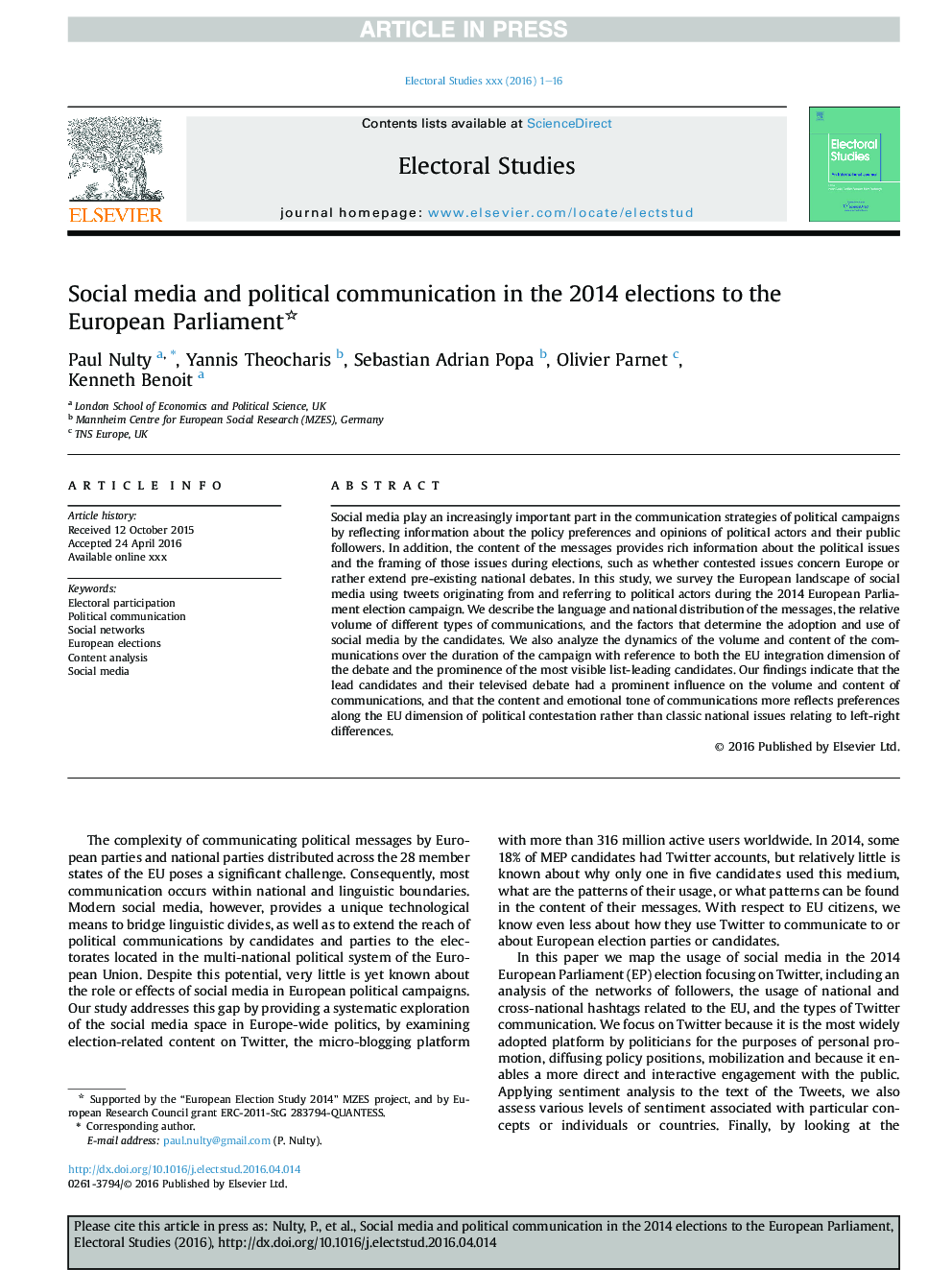| کد مقاله | کد نشریه | سال انتشار | مقاله انگلیسی | نسخه تمام متن |
|---|---|---|---|---|
| 7463482 | 1484949 | 2016 | 16 صفحه PDF | دانلود رایگان |
عنوان انگلیسی مقاله ISI
Social media and political communication in the 2014 elections to the European Parliament
ترجمه فارسی عنوان
رسانه های اجتماعی و ارتباطات سیاسی در انتخابات سال 2014 در پارلمان اروپا
دانلود مقاله + سفارش ترجمه
دانلود مقاله ISI انگلیسی
رایگان برای ایرانیان
کلمات کلیدی
شرکت در انتخابات، ارتباطات سیاسی، شبکه های اجتماعی، انتخابات اروپا، تجزیه و تحلیل محتوا، رسانه های اجتماعی،
ترجمه چکیده
رسانه های اجتماعی نقش مهمی در راهبرد های ارتباطی کمپین های سیاسی با بازتاب اطلاعات در مورد ترجیحات سیاسی و نظرات بازیگران سیاسی و پیروان عمومی خود دارند. علاوه بر این، محتوای پیام ها اطلاعات غنی در مورد مسائل سیاسی و تهیه مسائل مربوط به آن را در طول انتخابات فراهم می کند، از جمله اینکه آیا مسائل مربوط به مسائل مربوط به اروپا هستند یا نه، بحث های مرسوم ملی را گسترش می دهند. در این مطالعه، ما چشم انداز چشم انداز رسانه های اجتماعی را با استفاده از توییت های ناشی از بازیگران سیاسی در طی انتخابات انتخابات پارلمان 2014 بررسی می کنیم. ما زبان و توزیع ملی پیام ها، حجم نسبی انواع ارتباطات و عوامل تعیین کننده پذیرش و استفاده از رسانه های اجتماعی توسط نامزدها را توصیف می کنیم. ما همچنان پویایی حجم و محتوای ارتباطات را در طی دوره مبارزات انتخاباتی با اشاره به ابعاد یکپارچگی اتحادیه اروپا از بحث و برجسته ترین نامزدهای برجسته فهرست می سنجیم. یافته های ما نشان می دهد که کاندیداهای اصلی و بحث های تلویزیونی آنها تأثیر قابل توجهی بر حجم و محتوای ارتباطات داشتند و محتوای و تنوع احساسی ارتباطات بیشتر منافع ترجیحات در ابعاد اتحادیه اروپا از مخالفت سیاسی را به جای مسائل ملی کلاسیک مربوط به چپ تفاوت های راست
موضوعات مرتبط
علوم انسانی و اجتماعی
علوم اجتماعی
جغرافیا، برنامه ریزی و توسعه
چکیده انگلیسی
Social media play an increasingly important part in the communication strategies of political campaigns by reflecting information about the policy preferences and opinions of political actors and their public followers. In addition, the content of the messages provides rich information about the political issues and the framing of those issues during elections, such as whether contested issues concern Europe or rather extend pre-existing national debates. In this study, we survey the European landscape of social media using tweets originating from and referring to political actors during the 2014 European Parliament election campaign. We describe the language and national distribution of the messages, the relative volume of different types of communications, and the factors that determine the adoption and use of social media by the candidates. We also analyze the dynamics of the volume and content of the communications over the duration of the campaign with reference to both the EU integration dimension of the debate and the prominence of the most visible list-leading candidates. Our findings indicate that the lead candidates and their televised debate had a prominent influence on the volume and content of communications, and that the content and emotional tone of communications more reflects preferences along the EU dimension of political contestation rather than classic national issues relating to left-right differences.
ناشر
Database: Elsevier - ScienceDirect (ساینس دایرکت)
Journal: Electoral Studies - Volume 44, December 2016, Pages 429-444
Journal: Electoral Studies - Volume 44, December 2016, Pages 429-444
نویسندگان
Paul Nulty, Yannis Theocharis, Sebastian Adrian Popa, Olivier Parnet, Kenneth Benoit,
